MEET THE MIT BILINGUALS
Salute to Seniors | Class of 2020
35 of the many outstanding MIT 2020 students who have focused on both humanistic and scientific/technical fields reflect on their MIT education — and their visions for the future.
Click the names, or just scroll the page, to see what they have to say!
"Dual competence is a good model for undergraduates at MIT: master two fundamental ways of thinking about the world, one technical and one humanistic or social. Sometimes these two modes will be at odds with each other, which raises critical questions. Other times they will be synergistic and energizing."
— Professor David Mindell, Historian, Engineer, Co-founder and CEO of Humatics Corporation
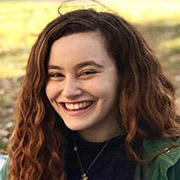 |
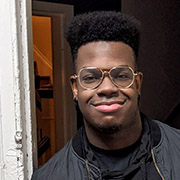 |
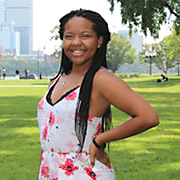 |
|
Madeline Abrahams
|
Ken Acquah |
Jordan Alford |
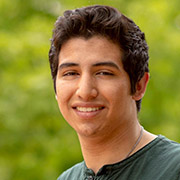 |
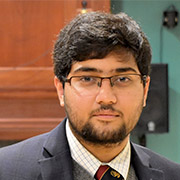 |
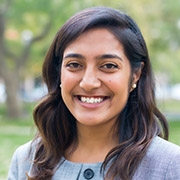 |
|
Andres Alvarado |
Dual Majors: |
Anoushka Bose |
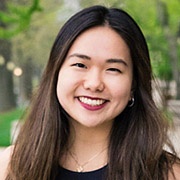 |
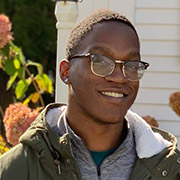 |
 |
|
Claudia Chen
|
Major: Philosophy |
Riley Ennis |
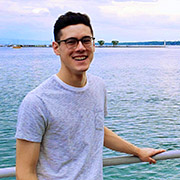 |
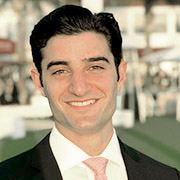 |
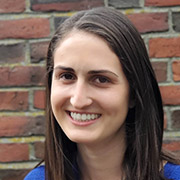 |
|
Liam Daniel Fenlon |
Major: Aero/Astro Engineering
|
Erin Grela |
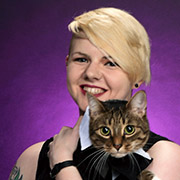 |
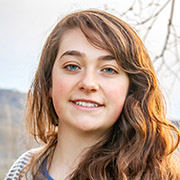 |
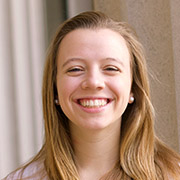 |
|
Major: Humanities + Engineering
|
Kaleigh Hunt
|
Carolyn Jons |
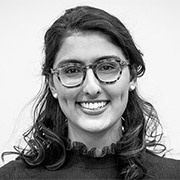 |
 |
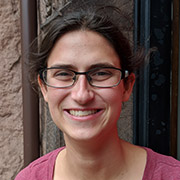 |
|
Talia Khan
|
Madeleine Kline |
Margaret Kosten
|
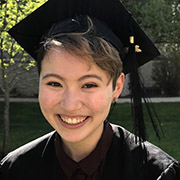 |
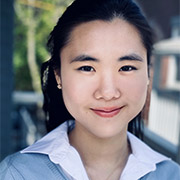 |
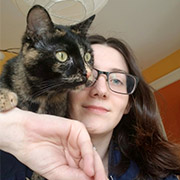 |
|
Grace Yukiko Kuffner |
Ohyoon Kwon |
Hannah Michaye Ledford
|
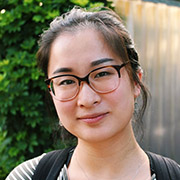 |
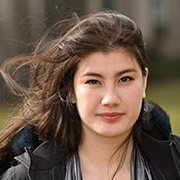 |
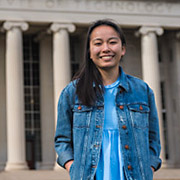 |
|
Laura Liao
|
Sonja Lindberg |
Cathy Nguyen |
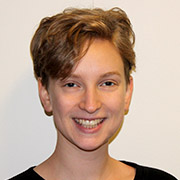 |
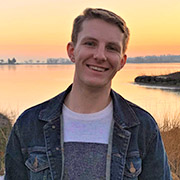 |
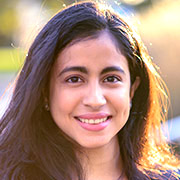 |
|
Major: Political Science
|
Jamie Rich |
Major: Materials Science |
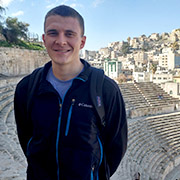 |
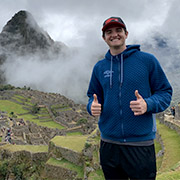 |
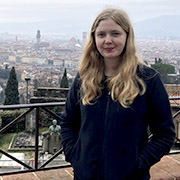 |
|
Dual Majors: EECS, Mathematical Economics |
Booker Schelhass |
Major: Computer Science and Electrical Engineering |
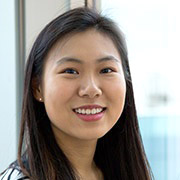 |
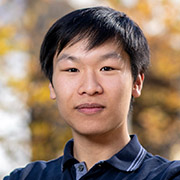 |
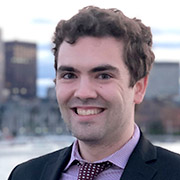 |
|
Dual Majors: Computer Science, Linguistics |
Dual Majors: Biological Engineering, Writing |
Chase Vogeli |
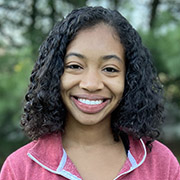 |
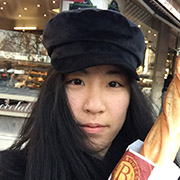 |
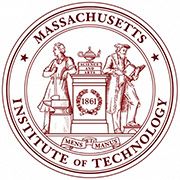 |
|
Cyndey Wong |
Sherry Zhou |
|
 |
"Technology doesn’t exist in a vacuum, so being able to think critically about how technology impacts society is very important." |
Madeline Abrahams '20
Major: Computer Science and Engineering
Minor: Women’s and Gender Studies
Vision: Making technology more inclusive; first step: as a product manager at Facebook
What have you most enjoyed about studying Women’s and Gender Studies (WGS)?
In every WGS class I took, I learned something new about human cultures and experiences. My ability to empathize increased as my world view expanded. WGS.222J Women and War stands out because that course fundamentally changed my understanding of violence. WGS.301 Feminist Thought also stands out, because it impacted how I view the meaning and importance of feminism.
How does this knowledge from WGS combine with your other studies at MIT?
As a computer science major, it is incredibly important to have an understanding of human cultures, oppression, and marginalization. So often, engineers build technology with only one user in mind, and they may not think about how to build products that are trans-inclusive or accessible for everyone. Also, technology doesn’t exist in a vacuum, so being able to think critically about how technology impacts society is very important.
An MIT education includes study in the technical, humanistic, and scientific fields. How do you think that range of knowledge will be valuable for your career — and life?
I have always loved the humanities, and coming to MIT I was concerned that I would not get the humanities education I craved. Luckily, I realized that MIT excels in the HASS fields [Humanities, Arts, and Social Sciences], and I loved all of the HASS classes I took. I took theater classes, anthropology classes, and got a minor in WGS. The HASS curriculum taught me how fascinated I am by sociology, anthropology, and feminist theory. I will continue to explore these fields after MIT, and I know that they will continue to enrich my intellectual life.
What are your plans for the future?
In my immediate future, I will be working at Facebook as a product manager. In the long term, I hope to work on making technology more inclusive.
 |
“It's always good to be well-rounded. I find it helps me tackle problems from angles others may not see.” |
Ken Acquah
Dual Majors: Computer Science, Economics
Vision: Problem-solving from fresh angles and multiple perspectives: first step: a startup
What have you most enjoyed about studying economics?
I enjoyed learning about non-pecuniary interactions in 14.661 Labor Economics. I also loved learning about causal inference in 14.32 Econometric Data Science.
How does the knowledge from this field, or your interest in it, combine with your other major or minor studies at MIT?
My work in 14.15 Networks and 14.32 Econometric Data Science combined well with my interest in machine learning to allow me to complete research at top institutions like IBM Watson and Microsoft Research.
An MIT education includes study in the scientific, technical, social science, arts, and humanities fields. How do you think that wide range of knowledge and perspectives will be valuable to you?
It's always good to be well-rounded. I find it helps me tackle problems from angles others may not see.
What are your plans for the future?
I plan to work in computer science and economics at a startup.
 |
"Scientific and technical knowledge is valuable, and combining that with knowledge and skills in the humanistic fields makes us much more capable of communicating — and of understanding the ideas and perspectives of others."
|
Jordan Alford
Dual Majors: Chemical Engineering, Spanish
Vision: Tying together diverse ideas to tackle complicated issues
What have you most enjoyed about studying Spanish?
Studying Spanish has opened my eyes to several pieces of literature that have changed my perspective on life. For example, in my favorite class, 21G.736 The Short Story in Spain and Hispanic America, I read several short stories and even created some of my own creative writing in Spanish. I’ve really enjoyed learning new ways to share my ideas and the ability to learn from others through another language.
How does the knowledge from Spanish studies combine with your other studies at MIT?
My studies in Spanish tie in well with my interests in chemical and environmental engineering. For example, water scarcity is a very pressing issue in Latin America that has several implications in environmental engineering. In fact, this subject matter is the topic of my thesis.
An MIT education includes study in the technical, humanistic, and scientific fields. How do you think that range of knowledge will be valuable for your career — and life?
The wide range of study that is included in an MIT education is important for being a well-rounded learner. Although our scientific and technical knowledge is valuable, combining that with skills in the humanistic fields (the arts, social sciences, and humanities) makes us much more capable of communicating, and also of understanding the ideas and perspectives of others.
What are your plans for the future?
After graduation I’ll be joining Shell’s environmental group in New Orleans.
 |
“Recent events have shown the need for greater scientific collaborations all over the world. Learning Japanese alongside bioengineering gives me a greater ability to work and collaborate with other engineering teams abroad.” |
Andres Alvarado
Major: Bioengineering
Minor: Japanese
Vision: Fostering global scientific collaboration
What have you most enjoyed about studying Japanese?
Meeting new people through class and getting to know them over three years as we moved up through the Japanese courses made learning the language so much more fun. This was especially the case when a lot of us got to do MISTI-Japan [MIT International Science and Technology Initiatives in Japan] together last summer.
How does the knowledge from this field, or your interest in it, combine with your other studies at MIT?
Recent events have shown the need for greater scientific collaboration between people all over the world. Learning Japanese alongside bioengineering gives me a greater ability to work and collaborate with other engineering teams abroad.
An MIT education includes study in the technical, humanistic, and scientific fields. How do you think that range of knowledge will be valuable for your career — and life?
When given the capability to study both humanities and STEM [science, technology, engineering, and math], I feel as if the two disciplines complement each other really well. Having a larger toolbox lets you approach any given situation from a number of directions and perspectives.
What are your plans for the future?
I’m not really sure yet. I'm sure it'll be fun though.
 |
“The HASS [humanities, arts, and social sciences] education I received at MIT has not only enriched my life but has shaped how I think about the world and my place in it.” |
Anuj Apte
Dual Majors: Philosophy, Physics
Minors: Mathematics, Music
Vision: First step: a PhD in physics, and expanding expertise in philosophy, music, and physics
What have you most enjoyed about studying philosophy?
The thing I enjoyed about philosophy was the opportunity to engage in meta-thinking, i.e., thinking about thinking and about the assumptions that underlie a thought process. The ability to question beliefs and desires in a straightforward manner was humbling.
Philosophy also taught me a lot about engaging in good-faith debates in order to get closer to the ”truth.” This meant also thinking about the reasons for a disagreement after the end of a discussion. One memorable discussion involved thinking about how to value future humans (should we discount lives in the future just as we do with goods?) and the impact such an abstract idea would have on tackling climate change.
How does the knowledge from this field, or your interest in it, combine with your other studies at MIT?
My philosophy major helped me learn more about the philosophy of science and thus informed how I think about physics. The training in foundational thinking that I received during my philosophy classes over the past four years turned me toward fundamental physics.
An MIT education includes study in the technical, humanistic, and scientific fields. How do you think that range of knowledge will be valuable for your career — and life?
Throughout my time at MIT, I have made conscious efforts to engage with disciplines that were outside my comfort zone. I discovered my interest in music composition during my junior year, and this prompted me to take classes in the area without any music training as a child. I have thoroughly enjoyed writing and playing music during the last two years, and I thank MIT for providing the right environment for developing my interest. The HASS [humanities, arts, and social sciences] education I received at MIT has not only enriched my life but has shaped how I think about the world and my place in it.
What are your plans for the future?
In the fall, I will be starting a PhD in physics at the University of Chicago. I also plan to take classes in music and philosophy during my graduate program.
 |
“Political science classes have made me a better citizen of both this country and the world.” |
Anoushka Bose
Dual Majors: Physics, Political Science
Vision: Contributing to international and national security law; first step: Georgetown Law
What have you most enjoyed about studying political science?
I have most enjoyed breaking down previous misconceptions about the field of political science and about the structures of government. Through political science, I have been exposed to how truly technical the field can be, and I have gained a lot of international knowledge through my classes. My classes with Professor Roger Petersen have sometimes reached such niche areas, i.e., war and identity in the Balkans, that I felt I was being exposed to ideas and cultures that I never would have previously known about. It has made me a better citizen of both this country and the world.
How does the knowledge from this field, or your interest in it, combine with your other major or minor studies at MIT?
My career at MIT has focused on the intersections of physics and political science within the field of nuclear policy and national security. Both parts of my studies have significantly contributed to my preparedness to work in either think-tank or government jobs in Washington, D.C., and the two disciplines have somewhat seamlessly flowed together over the years.
An MIT education includes study in the technical, humanistic, and scientific fields. How do you think that range of knowledge will be valuable for your career — and life?
This wide range has allowed me to thrive in situations that necessitated both technical physics knowledge and the skill sets I have acquired through political science. In particular, the MIT Washington, D.C., Summer Internship Program has critically brought together these sides of my education to prepare me well for future work in national security.
What are your plans for the future?
I will be attending Georgetown Law to focus on international and national security law.
 |
“Social and technological issues intersect more and more every day. What that means is that as engineers or social scientists, our solutions have to be informed by tech, and the social and physical sciences. We need to think critically." |
Joseph Edwards
Major: Philosophy
Vision: Thinking critically about social and technological issues; first step: consulting for IBM Security
What have you most enjoyed about studying philosophy?
I think college is supposed to teach you how to think, no matter what major or discipline you pursue. I advise underclassmen to understand which kinds of problems they like the best. What first drew me to philosophy was always feeling engaged during class and enjoying the discussions. As I wrote more papers and came up against tougher challenges, I appreciated how philosophy really forced me to pace around and think. I learned to understand and object to the arguments of others but also to probe the weaknesses in my own arguments. Some of my favorite classes, like 24.06[J] Bioethics and 24.131 Ethics of Technology, helped me figure out frameworks and lenses to apply ethical questions to all types of issues.
How does the knowledge from this field, or your interest in it, combine with your other studies at MIT?
One thing that I didn't understand before was the importance of writing a lot. It’s not just about accelerating productivity or making fewer mistakes. One of the things that I appreciate most about taking so many humanities courses is being able to express myself technically and creatively. Spending a lot of time thinking about what you're writing ends up being a tool to reflect on and learn about yourself.
An MIT education includes study in the technical, humanistic, and scientific fields. How do you think that range of knowledge will be valuable for your career — and life?
Social and technological issues intersect more and more every day. What that means for each of us is that as engineers, technical consultants, or social scientists, our solutions have to be informed by technology, and the social and physical sciences. We need to think critically, becoming accustomed to questioning the ideas of our field. It also means we need to be able to digest more material — psychology, sociology, technology, and history. The mere act of reading and writing constantly builds the muscles we need to move obstacles.
What are your plans for the future?
Starting this summer, I'll be working as a cybersecurity consultant for IBM Security.
 |
“I feel better equipped to see a problem from different perspectives thanks to studies in both engineering and the humanities.”
|
Riley Ennis
Major: Mechanical Engineering
Minor: Spanish
Vision: Improving medical communications; first step developing medical devices at a startup
What have you most enjoyed about studying Spanish?
My favorite experience was applying what I learned in my classes to my travels in Spain. I took 21G.795 Advanced Spanish Communication in Spain, and as a group we got to immerse ourselves in the culture of Madrid while improving our Spanish speaking skills in class.
How does the knowledge from this field, or your interest in it, combine with your other studies at MIT?
I am interested in medical devices, and I think that the medical field could benefit from more people who speak a second language to allow all patients to adequately communicate with their healthcare providers.
An MIT education includes study in the technical, humanistic, and scientific fields. How do you think that range of knowledge will be valuable for your career — and life?
My depth of knowledge in multiple disciplines prepares me to face a wide array of challenges. I feel better equipped to see a problem from different perspectives thanks to studies in both engineering and the humanities.
What are your plans for the future?
I plan to move to the San Jose area of California and work at a medical device startup.
 |
“I have long wanted to devote my career to tackling the world's toughest energy issues. Now I hope to contribute to electrification efforts, particularly in Africa, and am sure I'll be using my French given the the size of the Francophonie!" |
Liam Daniel Fenlon
Major: Business Analytics
Minor: French
Vision: Tackling the world's toughest energy issues; first step, the infrastructure and energy team at Macquarie Capital
What have you most enjoyed about studying French?
Studying French at MIT has been the very best of my MIT experience. From touring the Flemish painting exhibition at the Museum of Fine Arts and going to a concert of Jacques Brel's music with Madame Culot [Lecturer Ariane Culot-Nicolio], to eating at French restaurants in Boston with Madame Levet [Senior Lecturer Sabine Levet] and Professor [Bruno] Perreau, to our French movie pizza parties with Associate Professor [Catherine] Clark, I feel so grateful to all of my amazing teachers.
Most amazing of all, my MIT French education extended far from Cambridge. Whether it was Madame Culot taking a summer weekend to show me and other MISTI-Belgium students the museums, art, and food of Brussels, or spending two weeks in Paris with Madame Levet through January Scholars in France, I will treasure these rich cultural memories and stories for a lifetime.
How does the knowledge from French studies combine with your other studies at MIT?
I have long wanted to devote my career to tackling the world's toughest energy issues. My French studies allowed me to spend two summers abroad through MISTI [MIT International Science and Technology Initiatives], in Belgium at a cleantech startup and in Switzerland at Total SA. I now hope to contribute to electrification efforts around the world in developing countries, particularly in Africa, and I am sure that I will be using my French over the next few years given the importance of French energy companies and the size of the Francophonie!
An MIT education includes study in the technical, humanistic, and scientific fields. How do you think that range of knowledge will be valuable for your career — and life?
Working abroad was one of the hardest experiences of my life, but I grew more over my two summers abroad than I could have over years in the United States. Nothing would have been possible without Global Studies and Languages and my amazing professors. Struggling to work in another language, forcing myself to make new friends in a foreign culture, and adapting to life in a new city were tough, but my second summer abroad was much easier than my first, and now I can't wait until the first opportunity I have to work abroad again. Working abroad made me a far more appreciative and grateful person, and I now know just how much a small gesture of kindness can mean to someone who is far from their home and culture.
What are your plans for the future?
I will be working at Macquarie Capital in New York City on our infrastructure and energy team, which invests in energy infrastructure around the world. We have offices globally, and I'm hoping to work on some Latin America projects.
Top
 |
“A broad education yields more tools for solving interdisciplinary problems. In particular, I think combining engineering and the social sciences provides frameworks for thinking about machines and people." |
Hunter Fields
Major: Aeronautical and Astronautical Engineering
Minors: Economics and Finance
Vision: Solving issues involving machines and people; first step: position as an equity analyst with Warburg Pincus.
What have you most enjoyed about studying economics?
Economics changed my view on the frictions that arise when people interact with misaligned interests. I’ve always enjoyed games and thinking about players trying to out-compete one another. I found exploring game theory’s equilibrium concept as a viable solution to a game to be especially valuable. After taking 14.26 Economics of Incentives, I have a much stronger appreciation for how organizations use formal contracts, control right allocations, build long-term relationships, and shape organizational culture to reach a successful equilibrium.
How does the knowledge from economics combine with your other studies at MIT?
In my aerospace engineering major, I focused on decision-making and control theory. In economics, I broadened my understanding of decision-making to what happens when agents make choices to meet their own priorities. The combination provided a richer view of collaboration and competition. The joint study presents decision-making as a spectrum. On one end there is the unified, robotic decision-making that uses engineering, and on the other end, there is the individualized, competitive decision-making that uses game theory.
An MIT education includes study in the technical, humanistic, and scientific fields. How do you think that range of knowledge will be valuable for your career — and life?
A broad education yields more tools for solving interdisciplinary problems. In particular, I think combining engineering and the social sciences provides frameworks for thinking about machines and people. It’s important to match the right tool for the job, and no single view will perform well universally. I think the breadth of the MIT education has prepared me to be a more effective problem-solver, with a wider range of perspectives.
What are your plans for the future?
I will be moving to New York City where I will be working as a private equity analyst with Warburg Pincus.
 |
“Seeing many ways of approaching a problem is very useful for choosing the best set of solutions. Learning that there are many ways of approaching an issue — each with its own comparative advantages — is applicable in any career and in everyday life." |
Erin Grela
Dual Majors: Chemistry, Economics
Vision: Problem-solving with multiple forms of knowledge; first step: predoc research assistant for MIT development economists
What have you most enjoyed about studying economics?
The way in which the Department of Economics faculty actively work to share their love of research and provide undergrads with opportunities to discover their own version of that has been the best part of studying economics at MIT.
In one of my first economics classes, 14.46 Innovation Policy and the Economy, the professor walked us step by step through empirical papers, showing us how the authors had identified a problem worth researching, then combined their institutional knowledge with the tools of economics to isolate a question that they could answer with the data they had. She worked with us to choose topics we found exciting, and we applied a scaled-down version of the research process we learned to our own topics. I looked at how innovation affects inequality.
I was immediately hooked and have done UROPs [the Undergraduate Research Opportunity Program] in inequality-related topics since. I just submitted my senior thesis, which uses market design to look at education inequality.
How does the knowledge from this field, or your interest in it, combine with your other major or minor studies at MIT?
Chemistry and economics are, at face value, an unusual double major, but there is actually a lot of methodological overlap. For example, analyzing equilibrium systems and characterizing uncertainty are cornerstones of both domains. Seeing unexpected structural overlap like this has helped me appreciate academic study more generally.
An MIT education includes study in the technical, humanistic, and scientific fields. How do you think that range of knowledge will be valuable for your career — and life?
Seeing many ways of approaching a problem is obviously very useful for choosing the best set of solutions. Learning that there are many ways of approaching an issue — each with its own comparative advantages — is applicable in any career and in everyday life.
What are your plans for the future?
I will be starting as a predoctoral research assistant to MIT economics professors David Atkin and Esther Duflo this summer. I’ve had the privilege of working with them both as an undergrad and couldn’t be more excited to continue working with them!
 |
“A wide range of knowledge is valuable to me because so much of today's industry needs tech-savvy people who can communicate effectively." |
Emily Elliott Grey
Major: Humanities + Engineering
Vision: To bring writing and communication skills to a career in cybersecurity; first step: as a cybersecurity associate consultant at SpecterOps
What have you most enjoyed about studying humanities?
What I've enjoyed most about studying creative writing at MIT is the writing workshops. I've been doing creative writing since the sixth grade, but no one had ever read my work. At MIT, I've found the feedback from my peers and instructors to be immensely valuable — even when it's hard to hear.
How does the knowledge from this field, or your interest in it, combine with your other major or minor studies at MIT?
I didn't expect creative writing to have any common ground with computer science; I expected to keep my two passions quite separate. But over the course of these past few years, I've found the fields do overlap! 21W.765 Interactive Narrative was where I first saw the application of programming to writing. Another instance is my second internship. We were building a "hack your way out" escape room, and I was put on point for constructing the theme and story, since the clues and puzzles all had to tie together in one narrative.
An MIT education includes study in the technical, humanistic, and scientific fields. How do you think that range of knowledge will be valuable for your career — and life?
A wide range of knowledge is valuable to me because so much of today's industry needs tech-savvy people who can communicate effectively. Both computer science and creative writing are my passions, and having one as an outlet when I'm stuck on the other helps keep me happy and less stressed about productivity.
What are your plans for the future?
I've accepted a job as a cybersecurity associate consultant at SpecterOps! I'll be moving to Seattle with my cat, Alistair, at the end of May.
 |
“German studies have been incredibly beneficial from a career standpoint: They have opened new doors for me in chemical engineering, and allowed me to bring a more rigorous verbal, written, and oral communication skills to my technical background." |
Kaleigh Hunt
Dual Majors: Chemical Engineering, German
Vision: To use global education to expand industry horizons
What have you most enjoyed about studying German?
The connections and lifelong friendships that I have made through studying German at MIT have been one of the most valuable parts of my experience. Through classes themselves, I have found that the other students I have met in my German courses have become some of my closest friends at MIT, and the professors/lecturers are some of the closest faculty connections I've formed. In addition, learning German allowed me to take part in programs such as MISTI-Germany and GTL [Global Teaching Labs], where I was able to make connections relevant to my field, as well as lifelong friends, both from Germany and the United States. I am always astounded at the impact studying German has had on my life.
How does the knowledge from this field, or your interest in it, combine with your other studies at MIT?
Studying German has opened more doors for me to pursue my interests in chemical engineering. One of the most rewarding MIT experiences I have had was my MISTI [MIT International Science and Technology Initiatives] experience in the summer of 2018, when I was able to work on battery research at the Technical University of Munich in Germany. It was incredible to be able to take my interdisciplinary studies outside the classroom to a place where the fields intersected, allowing me to learn more about German language/culture while growing as an engineer.
An MIT education includes study in the scientific, technical, social science, arts, and humanities fields. How do you think that wide range of knowledge and perspectives will be valuable to you?
I believe that my German studies at MIT have been incredibly beneficial from a career standpoint: They have allowed me to bring a more rigorous verbal, written, and oral communication skills to my technical background, which I believe will be greatly valued in industry. In addition, I believe that as a result of my German studies, I will be able to make new connections with people from diverse backgrounds and cultures, something I have truly enjoyed during my time at MIT.
What are your plans for the future?
I am in the process of interviewing for industry positions.
 |
“It is exciting to take classes outside of the core engineering curriculum. These classes help me think about problems in new ways, and exercise other parts of my brain. It is really great to learn new language skills and become better at communicating with people around the world." |
Carolyn Jons
Major: Materials Science and Engineering
Minor: Chinese
Vision: First step: a PhD in materials science and engineering at Stanford
What have you most enjoyed about studying Chinese?
I have really enjoyed learning a new language and learning more about another culture. My favorite HASS [humanities, arts, and social sciences] classes have always been Chinese language classes, and a highlight of these classes was always the end-of-the-year banquet where we got to enjoy Chinese food and Chinese culture with our classmates and professors.
I also really enjoyed my MISTI-China [MIT International Science and Technology Initiatives in China] experience at Shanghai Jiao Tong University. I am still in touch with many of my friends and professors from this exchange.
How does the knowledge from this field, or your interest in it, combine with your other major or minor studies at MIT?
My major is materials science and engineering. While not directly related to Chinese, I know the skills I learned in my Chinese classes will help me in graduate school. Chinese will help me understand more journal articles and will improve my interactions with Chinese academics and other collaborators.
An MIT education includes study in the technical, humanistic, and scientific fields. How do you think that range of knowledge will be valuable for your career — and life?
I think it is really exciting to take classes outside of the core engineering curriculum. These classes are really fun, help me think about problems in new ways, and exercise other parts of my brain. It is really great to learn new language skills and become better at communicating with people around the world.
What are your plans for the future?
Next year I will be starting a PhD in materials science and engineering at Stanford.
 |
“My study of Spanish allowed me to work on projects in South America that broadened my perspective of the scale of certain scientific and health crises.”
|
Madeleine Kline
Dual Majors: Biology, Chemistry
Minor: Spanish
Vision: To bring a global perspective to the practice of medicine; first step: Harvard Medical School.
What have you most enjoyed about studying Spanish?
I have loved my Spanish classes at MIT. At an institute that is so technically focused, I really enjoyed having smaller, discussion-based classes that pushed me to think about the world through a different lens.
In one of my favorite courses, a class on public health in the Hispanic world, I remember being fascinated by how language facilitates the conceptualization of disease. Another cherished memory is of making a cake for a final project to represent different facets of the work of Mexican writer Rosario Castellanos.
How does the knowledge from this field, or your interest in it, combine with your other major or minor studies at MIT?
My studies in Spanish have certainly complemented my interests in chemistry and biology. My Spanish studies have included courses on public health, literature, and bilingual arts. I think understanding these topics, as well as being able to understand and communicate in a foreign language, are critical to any form of collaboration and communication professionally. Developing cultural humility and a broader understanding of what it means to be a global citizen are especially valuable to me as I aspire to a career in medicine.
An MIT education includes study in the technical, humanistic, and scientific fields. How do you think that range of knowledge will be valuable for your career — and life?
I think knowledge in a range of fields is critical to a successful education. College is about being pushed to think in new ways. My study of Spanish allowed me to work on projects in South America that broadened my perspective of the scale of certain scientific and health crises. For example, working on antibiotic resistance in Chile gave me a more complete sense of the magnitude of this international crisis than I could have gained working in one country or in one language. I think my ability to communicate in Spanish will remain valuable throughout my career as it gives me a broader outlook on global problems. It also enables me to connect more deeply with many different people.
What are your plans for the future?
I am planning to begin my medical and scientific training this summer at Harvard Medical School.
 |
“The fast-paced construction necessary for theater has allowed me to quickly implement some of my mechanical engineering learning.” |
Margaret Kosten
Dual Majors: Mechanical Engineering, Theater Arts
Vision: Combining a passion for theater and engineering
What have you most enjoyed about studying theater arts?
I could talk for days about the concrete skills that I learned being a stage manager for the Theater Arts section, but my favorite part was — by far — the people. The faculty are amazing theater professionals in their own rights, and getting to work alongside them on three MIT shows is something that I'll never forget. MIT student actors and technicians are also wonderful people. They enter the room with no ego, and they are there to be creative and to learn. Working with people like this is rare for the theater world, and I've loved every second.
How does the knowledge from this field, or your interest in it, combine with your other major or minor studies at MIT?
My other major at MIT is mechanical engineering. Studying theater has allowed me to grow in that field in two ways. I spent time building sets, and the fast-paced construction necessary for theater has allowed me to quickly implement some of my mechanical engineering learning. I’ve also learned communication and leadership skills by serving as stage manager. Being at the helm and knowing how to work with different types of people is something that will be useful no matter where I go next.
An MIT education includes study in the technical, humanistic, and scientific fields. How do you think that range of knowledge will be valuable for your career — and life?
I think my range of knowledge will contribute to my career success because I now have two options for a career path. It's nice to have choices. I could also potentially find a job that combines both passions.
No matter what I’m doing for a living, I plan to keep seeing theater. Knowing how shows are made and walking into a performance with a curiosity about what is going on behind the curtains has become a way of life for me.
What are your plans for the future?
Unfortunately, due to COVID-19, the entertainment industry is not at its peak. I was going to work for a company that does design and engineering for large entertainment events, but that job fell through. Until I find full-time work, I intend to freelance in theater in whatever ways are possible.
 |
“Acting is a fundamental study of communication and empathy, which has been applicable to every aspect of my career and life.” |
Grace Yukiko Kuffner
Dual Majors: Biology, Theater Arts
Vision: First step: an MD/PhD program; then, to serve medically marginalized populations
What have you most enjoyed about studying theater arts?
Majoring in theater has been a truly essential part of my MIT experience. In my four years, I have had the privilege of studying with some incredibly supportive, accomplished professors, and I have acted in dozens of student, department, and professional productions. I've particularly valued learning how to inhabit my body and voice with purpose and creativity.
How does the knowledge from this field, or your interest in it, combine with your other major or minor studies at MIT?
People are often confused by my two majors, but to me, biology and theater are two sides of the same coin: the former explores the tangible mechanisms of life, and the latter explores the intangible aspects of our humanity. I love the process of delving into the thoughts, feelings, and decisions of a character, then literally stepping into their shoes.
An MIT education includes study in the technical, humanistic, and scientific fields. How do you think that range of knowledge will be valuable for your career — and life?
Acting is a fundamental study of communication and empathy, which has been applicable to every aspect of my career and life.
What are your plans for the future?
I plan to take a gap year, then pursue an MD/PhD program starting in the fall of 2021. Ultimately, I hope to work at the intersection of basic science research and medicine to serve medically marginalized populations.
 |
“I hope to become a physician, and having a wide range of perspectives and knowledge will be crucial to my success in interacting with patients.”
|
Ohyoon Kwon
Dual Majors: Brain and Cognitive Sciences, Philosophy
Vision: To use a range of perspectives and knowledge in a career as a physician; first step, a research coordination position at MGH, followed by medical school
What have you most enjoyed about studying philosophy?
I've enjoyed engaging in dialectics on difficult questions that arise in life. This involves learning very carefully about what other people (mostly philosophers) have historically thought about the issues, reflecting on how I think about them, and discussing them with my instructors and peers. It's been satisfying to tackle philosophical questions, since it's like scratching an itch. It's also been empowering, because the mental muscles I get to build through studying philosophy extend to my everyday life. At MIT, I've focused on studying ethics, which has helped me be thoughtful about my own actions and those of others.
How does the knowledge from this field, or your interest in it, combine with your other major or minor studies at MIT?
I entered MIT with a primary academic interest in understanding the human mind. So, I decided to double-major in philosophy and brain and cognitive sciences, which has helped me understand both the immaterial and material aspects of the human mind. My studies in both fields have complemented each other, yet it still leaves me with the mystery of the mind-body problem: How is it that something so abstract and complex as the mind can be confined to the physicality of the brain?
An MIT education includes study in the technical, humanistic, and scientific fields. How do you think that range of knowledge will be valuable for your career — and life?
I hope to become a physician, and having a wide range of perspectives and knowledge will be crucial to my success in interacting with patients. Treating patients is a multifaceted process that involves both a scientific knowledge of illness and an empathetic understanding of the patients as individuals.
What are your plans for the future?
After graduation, I plan to work at Massachusetts General Hospital as a clinical research coordinator; I will be assisting with medical research projects. I later plan to apply to medical schools.
 |
“Studying writing and humanities at MIT has helped me to become a more empathetic person.” |
Hannah Michaye Ledford
Major: Writing
Minor: Earth, Atmospheric, and Planetary Sciences
Vision: To care for others with empathy and insight
What have you most enjoyed about studying writing?
I think studying writing and humanities at MIT has helped me to become a more empathetic person. In particular, as a writer, workshopping and critiques are an important part of being in a community and helping other writers. I was not a kind “critique-r” in my first writing class, 21W.755 Writing and Reading Short Stories. Over time, however, I've learned to be kinder and more intentional with critiquing not just writing, but other actions, projects, and my own life.
How does the knowledge from this field, or your interest in it, combine with your other major or minor studies at MIT?
My studies in other fields at MIT, particularly in planetary sciences, have helped me gain a new perspective and new information to incorporate into my writing; likewise, my writing has helped me in planetary sciences by making me a better teammate and by giving me new communication skills for papers and presentations.
An MIT education includes study in the technical, humanistic, and scientific fields. How do you think that range of knowledge will be valuable for your career — and life?
The scientific and technical aspects of my life have taught me better critical thinking and given me practical skills I didn't have access to before my time here at MIT. But, my humanities work at MIT has broadened my horizons, giving me new definitions of normal, of community, of care, and of humanity.
What are your plans for the future?
I plan to be happy, to take care of myself and my cat, and to take care of those around me. Plus, I want to adopt another cat.
 |
“At MIT, the integration of the sciences and the humanities has encouraged me to be more intentional in my scientific career.” |
Laura Liao
Major: Biology
Minor: Women’s and Gender Studies
Vision: To apply an understanding of privilege and power in the practice of reproductive health; first step, a medical degree at Northwestern University Feinberg School of Medicine
What have you most enjoyed about studying women’s and gender studies (WGS)?
I have loved every minute that I have spent in the WGS program. Before my WGS classes, I thought many feminist terms (like intersectionality) were simply created through internet discourse. I was both surprised and amazed to learn the long, long history of feminist activism that led to the popularization of these ideas. In my final semester, WGS.301 Feminist Thought has become an incredible forum for me to analyze issues of race, class, and gender with classmates who already have foundational knowledge about these topics.
How does the knowledge from this field, or your interest in it, combine with your other studies at MIT?
I am a Course 7 [biology] interested in medicine, especially reproductive health. My WGS classes have deepened my understanding of how privilege and power impact the quality of care that people receive, including why certain populations are disproportionately impacted by particular conditions. It has also enabled me to critically assess the role of medicalization in constructing narratives about LGBT people, women of color, and all gender minorities.
An MIT education includes study in the technical, humanistic, and scientific fields. How do you think that range of knowledge will be valuable for your career — and life?
I grew up devouring books relating to everything from history to anatomy to pure fantasy. At MIT, the integration of the sciences and the humanities has encouraged me to be more intentional in my scientific career: What scientific questions should we be asking? How can technical ideas be effectively communicated to the average person? How can we utilize technology to dismantle and fight power structures? Keeping SHASS [School of Humanities, Arts, and Social Sciences] questions close to my heart has also helped me find friends and colleagues with the same values; discussions about identity and equity are now a part of my everyday life.
What are your plans for the future?
I will be pursuing my medical degree at Northwestern University Feinberg School of Medicine. Sad to be leaving MIT, but very excited to be moving to Chicago!
 |
“I am so glad to have experienced this range of knowledge and perspectives. I am certain that it will make me a more thoughtful and capable leader.” |
Sonja Lindberg
Major: Computer Science and Engineering
Minor: French
Vision: To live in a Francophone country; to use my skills and knowledge to benefit the world; first step, as a business analyst at McKinsey & Co
What have you most enjoyed about studying French?
I've loved being able to dive into another culture and understand the world from a very different perspective from the one I grew up with. For example, discussing la laïcité [secularism] in France gave me a very new way of looking at how a government can manage religious freedoms and state secularism.
On another note, I also have very much enjoyed meeting all the lovely people that have been in my classes with me. I am very thankful for the incredible teachers and mentors that I was able to meet along the way; they challenged me and inspired me with their passion and knowledge of French language, culture, and history.
How does the knowledge from this field, or your interest in it, combine with your other major or minor studies at MIT?
French has allowed me not only to engage with topics related to world politics and global technology but also to discuss these topics with students from all different backgrounds and majors. The French perspective, combined with the diverse experiences of my classmates, has created interesting discussions in each class I've attended.
An MIT education includes study in the technical, humanistic, and scientific fields. How do you think that range of knowledge will be valuable for your career — and life?
I am so glad to have experienced this range of knowledge and perspectives. I am certain that it will make me a more thoughtful and capable leader by allowing me to combine my hard, technical skills with what are sometimes the even more important soft skills and understanding of the world I've gained from studying French.
What are your plans for the future?
Post-graduation, I will be working as a business analyst at McKinsey & Co. In the longer term, I hope to spend more time in France (unfortunately, my MISTI [MIT International Science and Technology Initiatives] plans for this summer were canceled), and I hope to live in a francophone country for part of my life. More broadly, my plans are to learn lots and put my skills and knowledge to use for the world.
 |
“What I’ve enjoyed most about learning Spanish is the ability to converse with people in their native language.” |
Cathy Nguyen
Major: Biological Engineering
Minor: Spanish
Vision: To build rapport across language barriers; first step, a position at a life science consulting firm
What have you most enjoyed about studying Spanish?
What I’ve enjoyed most about learning Spanish is the ability to converse with people in their native language. It has shown me how difficult it is to speak in a language that is not your primary language and how valuable it is to understand different cultures through language. My favorite experience in a class was in Spanish 4, where I got to make a video with my friends acting out skits and being silly.
How does the knowledge from this field, or your interest in it, combine with your other major or minor studies at MIT?
I think that it allows me to be able to communicate at least conversationally in Spanish, if not professionally, with colleagues from different areas of the biological engineering field. This should help me build rapport and ensure a better workplace experience for everybody.
An MIT education includes study in the technical, humanistic, and scientific fields. How do you think that range of knowledge will be valuable for your career — and life?
The HASS [humanities, arts, and social sciences] education that I have received at MIT has given me many tools to broaden my horizons. The experience has given me a more holistic view of the world and society and taught me to take into consideration different factors when approaching a situation.
What are your plans for the future?
I will be in Boston working at a life science consulting firm.
 |
“The technical grounding of an MIT education has been particularly valuable in politics, and I am proud to have spent my four years here studying political science.” |
Sarah Powazek
Major: Political Science
Vision: A career in government and the nonprofit sector with a focus on policy and technology
What have you most enjoyed about studying political science?
My favorite part of studying political science has been being surrounded by students and faculty that care about making the world better. I am grateful to have found such an inquisitive, dedicated niche at MIT, and I would like to thank [Assistant] Professor [Bernardo] Zacka and [Associate] Professor [J. Chappell] Lawson for teaching my favorite political science classes.
An MIT education includes study in the technical, humanistic, and scientific fields. How do you think that range of knowledge will be valuable for your career — and life?
I have found it exceptionally useful in government to engage in policy work and be able to understand the underlying technology that is being discussed. The technical grounding of an MIT education has been particularly valuable in politics, and I am proud to have spent my four years here studying political science.
What are your plans for the future?
I am currently serving as a legislative aide to Councillor Marc McGovern in the Cambridge City Council. I plan to continue my career in the government and nonprofit sector.
 |
“I am interested in the education field, where it is immensely important to understand the different ways people think, learn, and act; my humanities and technical classes have prepared me well for this.” |
Jamie Rich
Major: Humanities + Science
Vision: A career in education, beginning with a position developing curriculum at CodeAcademy
What have you most enjoyed about studying comparative media studies and writing?
I have enjoyed the broad set of disciplines that are covered in CMS [comparative media studies] classes. They attract people with a broad set of interests, and I always find class discussions to be interesting and thought-provoking; they bring together many different perspectives. It is through CMS classes — including CMS.595 Learning, Media, and Technology and CMS.594 Education Technology Studio — that I found my interest in education.
How does the knowledge from this field, or your interest in it, combine with your other studies at MIT?
At MIT, I studied CMS and mathematics. Within CMS, most of the classes I took revolved around education, and I was able to combine my interest in education and mathematics through the MIT Scheller Teacher Education Program. This program offers students a teaching licensing program. During my senior year, I got the chance to be a student teacher at a high school in Boston, where I worked with a mentor to teach precalculus and calculus.
An MIT education includes study in the technical, humanistic, and scientific fields. How do you think that range of knowledge will be valuable for your career — and life?
The interdisciplinary education I received at MIT has given me a wide range of knowledge. It has helped me reflect on the importance of all disciplines and understand the different perspectives people can have on a variety of issues. I am interested in the education field, where it is immensely important to understand the different ways people think, learn, and act; my humanities and technical classes have prepared me well for this.
What are your plans for the future?
After graduation I will be working as a curriculum developer at Codecademy in New York.
 |
“Economics opened up a whole new world and way of thinking for me.” |
Seeta Salgia Patel
Major: Materials Science and Engineering
Minors: Energy Studies, Economics
Vision: Position an analyst in energy/sustainability; then an MBA with a focus on the energy industry
What have you most enjoyed about studying economics?
My economics journey started when I took 14.01 Principles of Microeconomics as a requirement for the energy studies minor. I thoroughly enjoyed the class. Even though it was an introductory class, it covered such a wide breadth of topics that it opened up a whole new world and way of thinking for me. Based on this experience, I decided to concentrate in economics and eventually declare it as my second minor.
My favorite economics class has been 14.43 Economics of Energy, Innovation, and Sustainability with Assistant Professor Jing Li. It was my first foray into studying energy markets from an economic and policy-based perspective. The class gave me a more holistic understanding of the different factors that need to work together to effect change in energy and electricity markets.
How have you combined your interests in this field with your other major or minor studies at MIT?
Studying economics has exposed me to several aspects of the energy industry — from the nuances of energy problems faced by countries around the world to the challenges that are preventing deep decarbonization of the electrical power supply. I also learned about the problems electrical utilities face because of the increasing prevalence of distributed energy resources in the market.
What are your plans for the future?
I will be working as an analyst for Guidehouse in the area of energy, sustainability, and infrastructure. Later, I plan to enroll in business school in the hopes of making an even larger mark on the energy industry.
 |
“Economics taught me that it's important to not only know how to solve a problem, but also to know why you're solving it. As economists,the problems we try to solve and analyze are all fundamentally grounded in our humanity." |
Ryan Sander
Dual Majors: Electrical Engineering and Computer Science; Mathematical Economics
Vision: Applying technical skills to real-world problems that involve people; first step: an MEng in artificial intelligence at MIT
What have you most enjoyed about studying economics?
I've really enjoyed learning how to think "like an economist." 14.32 Econometrics in particular was the first class that showed me a new way of thinking about the world through a "causation vs. correlation" lens. While other majors focus on this type of thinking as well, I believe what makes this style of thinking come so naturally within economics is the fact that as economists, the problems we try to solve and analyze are all fundamentally grounded in our humanity.
How have you combined your interests in this field with your other studies at MIT? What’s great about having this range of studies in your education?
I'm also majoring in electrical engineering and computer science, with a specific focus in artificial intelligence (AI) and machine learning. Economics, particularly game theory and statistics, plays a major role in my studies, notably in my current research in multi-agent reinforcement learning. Additionally, the mathematics classes I've had the chance to take through the 14-2 program (mathematical economics), such as 18.100P Real Analysis and 18.085 Computational Science and Engineering, have significantly helped me with my studies and research in AI.
An MIT education includes study in the technical, humanistic, and scientific fields. How do you think that range of knowledge will be valuable for your career — and life?
Economics, for me, has been a crucial part of my studies that allows me to apply my technical skills to real-world problems involving people. Economics reminds me that it's important to not only know how to solve a problem, but also to know why you're solving it. Having had the opportunity to dedicate such a significant fraction of my studies to this field has allowed me to think more broadly about topics I may otherwise have never encountered. 14.73 The Challenge of World Poverty in particular stands out as a class that I'm so thankful to have taken, because this class inspired me to become more active with community service at MIT, and also to be thankful for all I have in my life.
What are your plans for the future?
This summer, I'll be working as a data science and machine learning intern with Nasdaq, and this fall, I'll begin my MEng in artificial intelligence here at MIT. After my MEng is completed, I'll be working for the U.S. Department of Defense as an image scientist.
 |
"I am very interested in the design of medical devices, and my knowledge of Spanish can be useful in providing these devices to South American countries. That would bring me great joy."
|
Booker Schelhaas
Major: Mechanical Engineering
Minor: Spanish
Vision: First step: research on exoskeletons in Brazil on a Fulbright scholarship — and learning Portuguese!
What have you most enjoyed about studying Spanish?
For me, the most exciting part of studying Spanish was seeing the progress that came with taking more classes and making Spanish a bigger part of my life. For instance, it was awesome to return to South America recently and be able to speak to people without them knowing I was American. That was quite a thrill!
How have you combined your interests in this field with your other major or minor studies at MIT? What’s great about having this range of studies in your education?
I am very interested in the design of medical devices, and I see my knowledge of Spanish can be useful in providing these devices to South American countries. That would bring me great joy!
An MIT education includes study in the technical, humanistic, and scientific fields. How do you think that range of knowledge will be valuable for your career — and life?
The variety of my education has given me such a joy for the details of life, especially valuing and appreciating other cultures. Spanish has really become a part of my identity; I mainly listen to music in Spanish, and I try to use it whenever possible. I’m so thankful for the people at MIT who helped form this part of my identity.
What are your plans for the future?
I will be going to Brazil next February on a Fulbright scholarship; I will be conducting research on using exoskeletons for rehabilitation. I have begun learning Portuguese, and I hope to grow in that area so that I can use Spanish and Portuguese for the rest of my life!
 |
“Learning a language opens up your range of communication and exposes you to new people and ideas.” |
Kristin Sheridan
Major: Computer Science and Electrical Engineering
Minor: Spanish
Vision: First step: a PhD in computer science at MIT: learning new languages!
What have you most enjoyed about studying Spanish?
I started taking Spanish because I love learning new languages and find it very exciting to be able to read or have a conversation in another language. In my time at MIT, I’ve had the opportunity to visit Chile and Spain via MISTI [MIT International Science and Technology Initiatives] and GECD [Global Education and Career Development] programs, largely made possible through GSL [Global Startup Labs]. I got to meet and live with amazing new people, and it wouldn’t have been possible without the support of the department and classes offered on campus.
How does the knowledge from this field, or your interest in it, combine with your other studies at MIT?
While Spanish doesn’t relate specifically to EECS [electrical engineering and computer science], I believe learning a new language is helpful in any field. Learning a language opens up your range of communication and exposes you to new people and ideas.
An MIT education includes study in the technical, humanistic, and scientific fields. How do you think that range of knowledge will be valuable for your career — and life?
Many of my classes in SHASS [the School of Humanities, Arts, and Social Sciences] have made me think about the consequences of how new technologies are applied, which is something that will be important to take with me as I work in technical fields. A greater awareness of the consequences of the projects I work on can help me make more informed decisions.
I also find studying languages fun and relaxing. Being able to read or converse in a language other than English is exciting and opens you up to new ideas and ways of thinking. I know that continuing to learn new languages is something that will make me happier.
What are your plans for the future?
I plan to pursue an MEng next year in MIT’s Department of Electrical Engineering and Computer Science. Then I will apply to PhD programs to continue studying computer science. I also hope to have time to continue studying Spanish or begin learning a new language.
 |
“I have found a lot of overlap between linguistics and computer science. For example, there are many interesting questions about how humans learn and process language and how this can be paralleled or mimicked by computers." |
Christine Soh
Dual Majors: Computer Science, Linguistics
Vision: Making new tools for computational linguistics; first step: a PhD in linguistics at UPenn
Profile Story: Christine Soh '20
What have you most enjoyed about studying linguistics?
I have really enjoyed learning about the formal ways of analyzing language, which is all around us. I love that I can have a conversation with anyone and everyone about the concepts I'm learning and the questions I'm exploring, because everybody is highly proficient in language.
One particular skill that I have appreciated learning, especially this past year as I was doing more linguistic fieldwork with languages such as Wolof and Azerbaijani, is how to build and support an argument supporting a theory of internal syntactic structure. I enjoy going past the first theory that I can think of and being creative in considering as many alternatives as possible.
This past semester, in 24.918 Research Seminar, I was working on an individual research project exploring noun phrase ellipsis in Wolof, for which I had built up a theory of ellipsis based on about six hours of data collection from a language consultant. Two weeks ago, I got new data that didn't fit with my theory, and after going back and reexamining the theories that I had been considering, I was able to develop a more cohesive story. I was then able to find other languages that work the same way.
How does the knowledge from this field, or your interest in it, combine with your other major or minor studies at MIT?
I have found a lot of overlap between linguistics and computer science. For example, there are many interesting questions about how humans learn and process language and how this can be paralleled or mimicked by computers. Additionally, in my UROP [Undergraduate Research Opportunities Program] in speech processing in the realm of clinical diagnosis, I'm able to combine the technical skills and the algorithmic problem-solving from my Course 6 [electrical engineering and computer science] classes with the linguistic knowledge of phonetics and questions about the human processes of perceiving and creating speech.
An MIT education includes study in the technical, humanistic, and scientific fields. How do you think that range of knowledge will be valuable for your career — and life?
I have appreciated exploring a variety of classes, in all realms, and it has definitely helped me widen my perspective and to think about the bigger picture. I appreciate having the opportunities to broaden my view and to think about problems through several lenses, improving my problem-solving skills. Also, having a broader base of knowledge has let me appreciate more in life, at both a practical level of being able to identify the things that I've learned in the world around me as well as at a more abstract level of spending time exploring various concepts and their connections.
What are your plans for the future?
I will be pursuing a PhD in linguistics at the University of Pennsylvania beginning in the fall! I'm excited to continue asking and exploring questions about language and using computational models to try and discover more about various linguistic processes.
 |
“Studying writing at MIT has not been a digression for me; it has been integral. It's a deep exploration into what makes us human.” |
Steven Truong
Dual Majors: Biological Engineering, Writing
Vision: Helping people; first step: Stanford's MD/PhD program
What have you most enjoyed about studying writing?
I loved simply being able to explore a passion that I’ve always neglected! It’s so refreshing to be able to tap into my creative juices after working on the fifth derivative of the day. My favorite writing class was CMS.307 Critical World-Building taught by Professor Junot Díaz. In the class, we really (one might say, “critically”) looked at worlds and dissected the underlying question of why they worked. I discovered that James Cameron’s Avatar is basically Pocahontas in space! It was very eye-opening for me to see what drives these narratives. The class also made me much better at analyzing the chemistry between characters and worlds for my own science fiction writing.
How have you combined your interests in this field with your other studies at MIT?
I want to help people using the power of what I’ve learned as a biological engineering major, and writing will help me do that because it has helped me become a better communicator. It’s also grounded me in what I care most about: people. Writing is this deep exploration into what makes us human. When we craft characters, we imbue them with life.
An MIT education includes study in the technical, humanistic, and scientific fields. How do you think that range of knowledge will be valuable for your career — and life?
When I write, I try to make my characters as alive as possible. They’re these people who have fears, wants, loves, grudges, aspirations, and everything else that makes someone human. And this is the case with writing in general! Think about it: If you ask Harry Potter a question, you (sort of) can predict his responses because you have come to know who he is as a person. Literature helps you realize that every human being is a person with a mind-bogglingly complex life. Just think about the “character development” a college student goes through, from freshman year to senior year. I’ve certainly grown more empathy as a writer, and this is rather important because I hope to go into medicine.
What are your plans for the future?
I will be spending two years studying in the United Kingdom thanks to a Marshall Scholarship. After that, I plan to attend Stanford University for MD-PhD training. I dare say that these opportunities were made possible in part by majoring in writing. Studying writing at MIT has not been a digression for me; it has been integral.
 |
“Learning a second language is an incredibly rewarding experience, one that opened my mind to other cultures and ways of life.” |
Name: Chase Vogeli
Major: Mathematics
Minor: German
Vision: A career in academia, beginning with a PhD in mathematics at Cornell
What have you most enjoyed about studying German?
Learning a second language is an incredibly rewarding experience, one that opened my mind to other cultures and ways of life. As an example, my knowledge of German from MIT classes allowed me to communicate in German with my host family when I did MISTI's Global Teaching Labs program last IAP [an MIT International Science and Technology Initiatives program held during Independent Activities Period]. Being able to speak their native language enriched the cultural experience overall.
How does the knowledge from this field, or your interest in it, combine with your other studies at MIT?
Studying German enabled me to have some wonderful mathematical experiences abroad during my time at MIT. Last summer, I worked on a research project in math in Germany. Last IAP, I taught math at a high school in Germany through MISTI's Global Teaching Labs.
An MIT education includes study in the technical, humanistic, and scientific fields. How do you think that range of knowledge will be valuable for your career — and life?
Being exposed to the different way that math is researched and taught in Germany will certainly be valuable as I pursue a career in academia. The ability to speak a foreign languages also provides the opportunity for more meaningful travel.
What are your plans for the future?
I will be beginning my PhD in mathematics at Cornell University in the fall.
 |
“Greater awareness of the needs of minoritized groups is absolutely necessary to perform research and create technology that can benefit everyone.” |
Cydney Wong
Major: Biological Engineering
Minor: Women’s and Gender Studies
Vision: To help make science and engineering more inclusive; first step: a PhD program at Georgia Tech and Emory University’s joint biomedical engineering program
What have you most enjoyed about studying women’s and gender studies?
I have really enjoyed the breadth of knowledge I gained from women’s and gender studies (WGS); I especially liked how this knowledge increased my own self-awareness. I came into my first WGS class thinking I knew all about feminism and intersectionality as a mixed-race woman, but I soon realized that there’s so much more I could learn — not just about gender, but about all the other aspects of identity that play into our lives, and the power structures that lend to marginalization and oppression.
One really eye-opening moment was in WGS.228 Psychology of Sex and Gender, one of my favorite classes. We first read a piece about the “invisible knapsack” of white privilege, detailing advantages that white Americans have over people of color, and these ideas were all quite familiar to me. However, we then did another invisible knapsack exercise on cis privilege, and I had never thought about some of the difficulties trans individuals face until that moment. It was really helpful to recognize my own privilege and think about how it affects my life.
How does the knowledge from this field, or your interest in it, combine with your other major or minor studies at MIT?
Issues of identity, intersectionality, diversity, and equity are apparent in every part of our lives, and my WGS classes have really allowed me to realize this. As a biological engineering major, I recently wrote a research paper on the common undertreatment and misdiagnosis of women due to biases and gender norms held by both patients as well as healthcare researchers and providers. Greater awareness of the needs of minoritized groups is absolutely necessary to perform research and create technology that can benefit everyone. So, I definitely will be using what I learned from my WGS minor going forward in my research efforts to combat the unconscious bias that persists in science and engineering today.
An MIT education includes study in the technical, humanistic, and scientific fields. How do you think that range of knowledge will be valuable for your career — and life?
I am so thankful for my wide range of classes because I think they have allowed me to find balance during college. This has been really beneficial for my mental health throughout my time at MIT and provided knowledge that will continue to benefit me after MIT. I want to stay involved in activism around the issues that I find most important, and I think my WGS classes have given me a good foundation. They’ve helped me see the best routes for impact and activism in the real world, especially as a scientist and engineer.
What are your plans for the future?
I will be pursuing my PhD at Georgia Tech and Emory University’s joint biomedical engineering program.
 |
"Studying French at MIT has helped improve my communication skills, cultural awareness, and open-mindedness, all of which are crucial to teamwork.” |
Sherry Zhou
Dual Majors: Biology, Chemistry
Minor: French
Vision: First step: the Mayo Clinic Medical Scientist Training Program; and, since that's in Minnesota, possibly ice fishing!
What have you most enjoyed about studying French?
The highlight of my French studies was my first trip to France as a January Scholar in France during IAP [Independent Activities Period] 2019. Experiencing new places , wandering around the quartiers and boulevards, and enjoying unique and delicious meals were all eye-opening. I truly felt immersed in Parisian culture and thoroughly loved the opportunity to experience the rich culture, history, and artistic aspects of Paris.
How does the knowledge from this field, or your interest in it, combine with your other studies at MIT?
Studying French at MIT has helped improve my communication skills, cultural awareness, and open-mindedness, all of which are crucial to teamwork and collaboration in the scientific research that is central to my degree in chemistry and biology.
An MIT education includes study in the technical, humanistic, and scientific fields. How do you think that range of knowledge will be valuable for your career — and life?
Through my French studies at MIT, I have been able to explore a vast array of topics that have furthered my awareness and knowledge of the world around me. Together with my studies in chemistry and biology, studying French has helped open my mind even more to new perspectives and possibilities in science, healthcare, and communication. This will enable me to tackle problems in these areas in my future career.
What are your plans for the future?
After MIT, I might learn how to ice fish since I will be living in cold and snowy Rochester, Minnesota. I will be matriculating at the Mayo Clinic Medical Scientist Training Program.
Prepared by MIT SHASS Communications
Office of Dean Melissa Nobles
Editorial and Design Director: Emily Hiestand
Consulting Editor/Writer: Kathryn O'Neill
Senior Communications Associate: Alison Lanier
With special thanks to the MIT SHASS Many Hats Communications Group